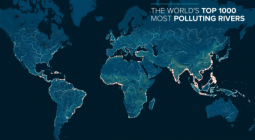Tiny turtle pooed ‘pure plastic’ for six days after rescue from Sydney beach
A baby green sea turtle rescued from a Sydney beach had eaten so much plastic that it took six days for the contents to be excreted, according to Taronga zoo’s wildlife hospital.
The 127-gram hatchling was found lying on its back in a rockpool near Sydney’s Tamarama beach. It was missing one of its four flippers, had a chip in another, and had a hole in its shell.
Carers said that aside from these injuries, the turtle appeared to be in good physical condition and had no trouble swimming.
“But then it started to defecate, and it defecated plastic for six days. No faeces came out, just pure plastic,” the Taronga veterinary nurse Sarah Male said.
“It was all different sizes, colours and compositions. Some were hard, some were sharp, and with some, you could tell the plastic had writing on it. This is all some of these poor little things are eating. There’s so much plastic around they’re just consuming it as their first initial food,” she said.
Male has described the turtle, which has returned to health and now weighs almost 400g, as a “bagel with flippers”.
Despite progress, it could be a whole year before he is released back into the wild and coastal waters.
The hospital says the size of tiny hatchlings makes them particularly vulnerable to prey, and they want the animal to have the best chance of life. As well as size, ocean temperatures are also a factor – warmer waters are better for turtles.
Taronga’s wildlife hospital cares for up to 80 marine turtles a year – many admitted with injuries after becoming entangled in fishing lines or from digesting hooks and plastics.
“If everybody just takes a little bit of their time to pick up a bit of rubbish – it doesn’t have to be on the beach – then hopefully we can make a difference,” Male said.
States including New South Wales, Queensland and Western Australia, have all brought in tougher bans on single-use plastic, but the scale of the problem is at times overwhelming.
More than 8m tonnes pour into oceans around the world each year. The majority is carried out to sea by rivers, dumped along coastlines or abandoned by fishing vessels.
A study of a beach on Henderson Island, one of the world’s most remote places, found nearly 38m pieces of plastic strewn across the sand.
However, CSIRO researchers reported in June that local actions were making a difference with the amount of plastic pollution on Australia’s coast decreasing by up to 30% on average as a result of work by local governments to reduce litter.
Lara Sonnenschein



